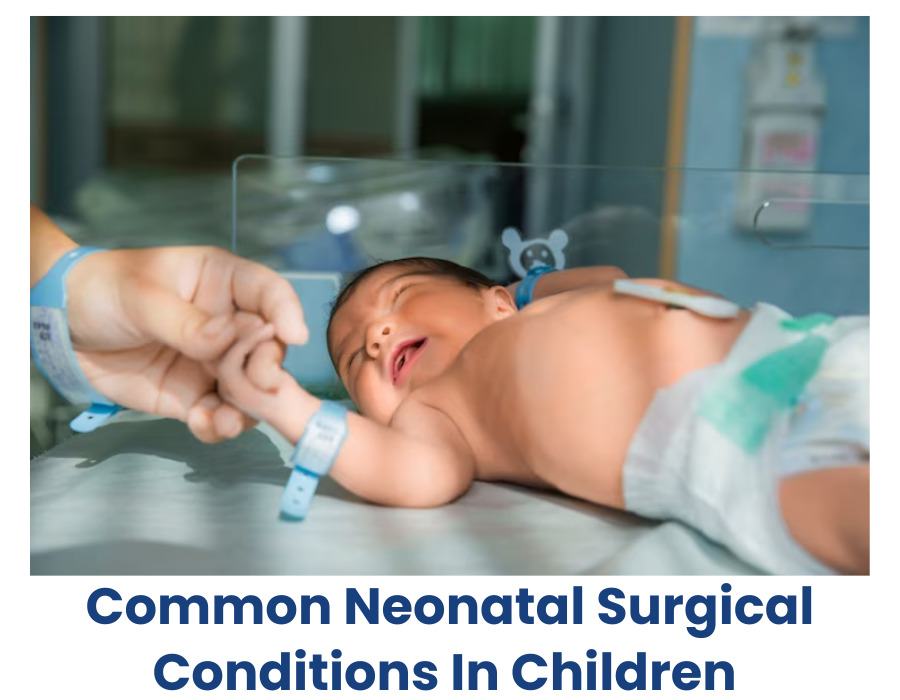Common Neonatal Surgical Conditions in Children

Welcoming a new life into the world is a beautiful experience, filled with hopes and dreams for a child’s future. However, sometimes, newborns face medical conditions that require specialized care. Dr. Apoorva Kulkarni, a renowned pediatric surgeon in Thane, Bandra, and Chembur, is here to help families in understanding and dealing with these common neonatal surgical conditions. In this blog, we will explore common neonatal surgical conditions.
Anorectal Malformations
Anorectal malformations are congenital conditions where the baby is born with an abnormal anus or rectum. These malformations can vary in complexity and often require surgical correction to establish proper bowel function.
Annular Pancreas
Annular pancreas is a rare congenital condition in which a ring of pancreatic tissue encircles the duodenum, the first part of the small intestine. Surgical intervention is necessary to relieve duodenal obstruction caused by this anomaly.
Congenital Diaphragmatic Hernia
Congenital diaphragmatic hernia occurs when a hole in the diaphragm allows abdominal organs to move into the chest cavity, affecting lung development. Surgical repair is often required to move the organs back to their proper position and restore normal breathing.
Esophageal Atresia
Esophageal atresia is a birth defect in which the esophagus does not develop properly, leading to a gap between its two segments. Surgery is essential to connect the esophagus and allow the baby to eat and swallow normally.
Gastroschisis
Gastroschisis is a condition where a hole forms in the baby’s abdominal wall, allowing the intestines to protrude outside the body. Surgical repair is necessary to place the intestines back into the abdominal cavity.
Heart Defects
Congenital heart defects vary widely and can include conditions like ventricular septal defects, atrial septal defects, and patent ductus arteriosus. Surgical procedures may be required to correct these defects and ensure proper heart function.
Hirschsprung’s Disease
Hirschsprung’s disease is a condition where certain portions of the baby’s colon lack nerve cells, leading to bowel obstruction. Surgical treatment involves removing the affected colon segments.
Intestinal Blockages
Intestinal blockages in newborns can result from a variety of causes, including meconium ileus, meconium plug syndrome, and atresia. Surgery is often necessary to remove the blockage and restore bowel function.
Lung Lesions and Tumors
Neonates can develop lung lesions or tumors that require surgical intervention, such as lobectomy or removal of the affected tissue to ensure proper lung development and function.
Necrotizing Enterocolitis
Necrotizing enterocolitis is a severe inflammatory condition affecting the intestines, often seen in premature infants. Surgical procedures may be necessary to remove necrotic tissue and repair the damage.
Omphalocele
Omphalocele is a congenital condition in which the baby’s abdominal organs protrude through the abdominal wall. Surgical repair is performed to place the organs back into the abdominal cavity and close the defect.
Short Bowel Syndrome
Short bowel syndrome can occur when a significant portion of the small intestine is removed due to surgical interventions for various conditions. Nutritional support and careful monitoring are crucial for these infants.
Tracheoesophageal Fistula
Tracheoesophageal fistula is a condition where there is an abnormal connection between the baby’s trachea and esophagus. Surgery is essential to correct this defect and prevent complications such as aspiration pneumonia.
In Conclusion: Understanding these common neonatal surgical conditions is crucial for parents and healthcare professionals to facilitate early diagnosis and timely interventions. Surgical procedures can significantly improve the quality of life for newborns with these conditions, allowing them to grow and develop normally. If you suspect that your child may have any of these conditions, it’s essential to consult with a pediatric surgeon or healthcare provider for proper evaluation and guidance.
